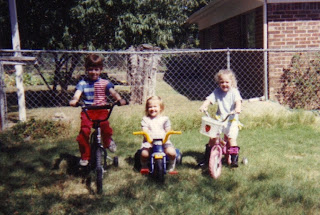 Mother daughter relationships should be one of the seven wonders of the world. They are painful yet intense and loving. They are forever evolving and changing yet stay the same. It is a strange phenomenon…
Mother daughter relationships should be one of the seven wonders of the world. They are painful yet intense and loving. They are forever evolving and changing yet stay the same. It is a strange phenomenon…As a child my mother worked sporadically, but mostly she was simply a homemaker. She cooked, cleaned, and raised us. I expected her to be my homeroom mother, to be in the PTO, and make cupcakes for all my class events. My mother looked at this from a different point of view. She had four children and refused to do everything for all of us. Since we would be jealous if she did something for one of us and not for the other, she decided to do nothing for any of us. Beyond being our pre-K through first grade room mothers, my mother did not participate in our school activities.
This was really difficult for me. My older sister had seven years on me and was basically out of school before I have definite memories. My older brother (my senior by only 14 months) refused to do well in school and always required special attention from my parents to make sure he did not fail and have to repeat a grade. It wasn’t that he wasn’t smart and intelligent, he just never "applied himself." My little sister was smart, but she struggled in school. In her early grades she had a problem with reading- she hated it and never tried. Because of this she was below her reading level. My mom worked with her every evening on her homework. Later on we found that math did not make sense to her. And as she entered high school, she had problems with the natural sciences as well. Because my siblings commanded so much of my mother's time during homework sessions, I often felt ignored and torn. I enjoyed the attention from my teachers for being the highest scoring student in the classroom, but felt neglected at home because I easily made straight A's.
I remember the end of each six weeks bringing
 hatred to my heart. I would bring home my perfect report card in triumph. Each time my mother would glance at it, sign it, and close it. Next, she would lecture my brother and sister for thirty minutes about their B's, C's, and D's. If my brother or sister did manage to make an A, there would be ice cream and celebration.
hatred to my heart. I would bring home my perfect report card in triumph. Each time my mother would glance at it, sign it, and close it. Next, she would lecture my brother and sister for thirty minutes about their B's, C's, and D's. If my brother or sister did manage to make an A, there would be ice cream and celebration.Awards ceremonies were another difficult time for me. I always received the top awards: perfect attendance, citizenship, good grades, and even the coveted "Special Student Award" given out at the end of the eighth grade year to one female and one male student. I would always search the bleachers for my mother, but she was never there. My peers' mothers would be there, cheering on my fellow students, but my mothers face never appeared. I would bring the awards home to a obligatory nod and then they disappeared into the box my mother kept all my achievements in. Unlike Brave Orchid's "glass case" that displayed her children's achievements (WW, 128). Mine were kept in a plastic box in the storage room. Never to be seen by anyone. Much like Kingston, I often contemplated "not making A's" just to spite my parents (WW, 99). I wondered if they would even notice if I quit bringing home perfect report cards and numerous awards. They never seemed to care, so why should I. They took it for granted that I was always going to make perfect grades, somewhere in my senior year I simply quit doing so. I wanted to see how they would react and my teachers praise alone was no longer enough. I had worked my whole life for a "good job."
My mother did notice eventually. She explained that she had never made a big deal of it because she did not think I needed the praise. She felt that my teachers pampered me too much. She wanted me to be strong and not expect things to be handed to me. She never thought that I had to work hard for my grades like my siblings. Because it was easy for me, I did not deserve the praise. This was a hard pill to swallow. I definitely did not agree. Just because I have always done well did not mean I didn’t work my butt off for it. While my brother and sister were out with friends I was at Starbuck or the library studying. I worked a full time job and still managed to keep up and score high grades. After a long discussion my mother and I finally were able to see eye-to-eye. She apologized for making me feel like she did not care, but would not apologize for not giving me excessive praise. She felt that I was a stronger person because of it. As I have mentioned before, I cannot change my mother so I simply have to accept her point of view and enjoy the praise she does give me. Although I experienced some pain and feelings of neglect, I know that everything she does is because she loves me and wants what is best for me. Thus I can survive anything that comes my way. She will always be in my corner.

















